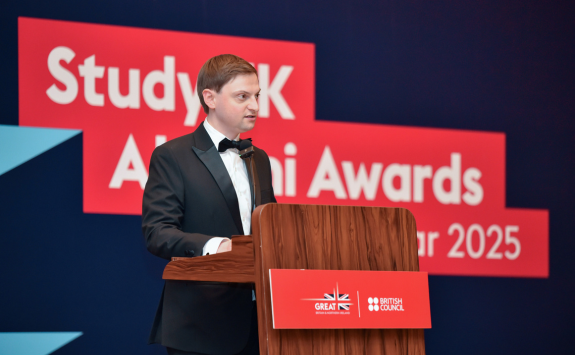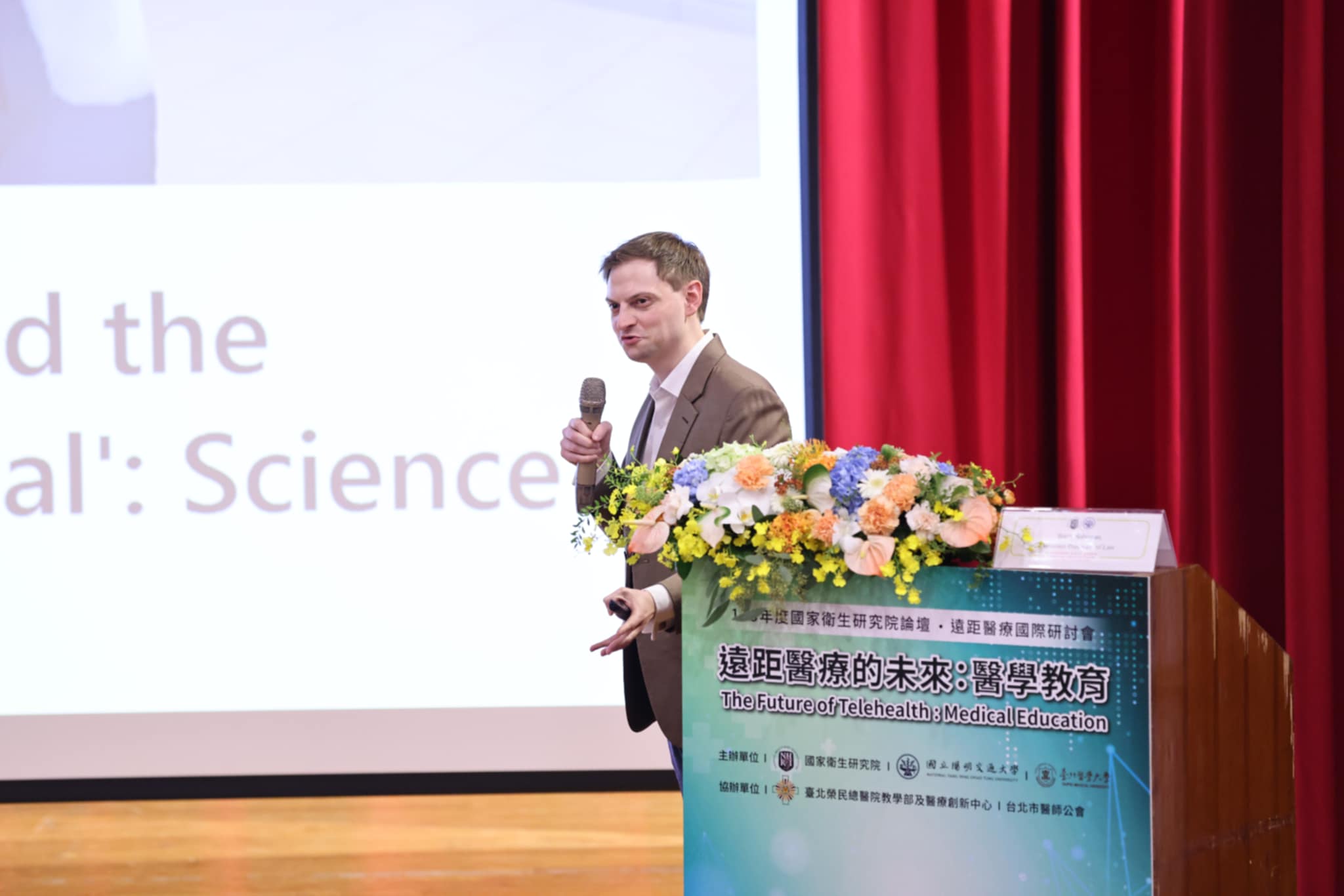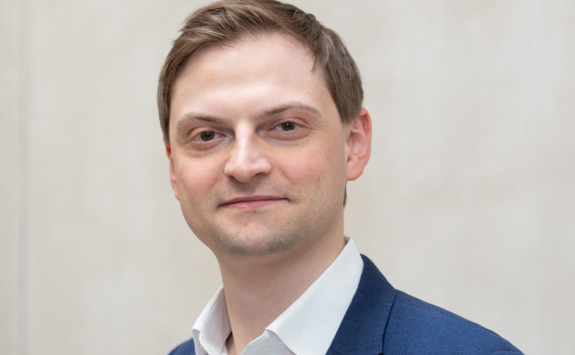Law alumnus wins at British Council Study UK Alumni Awards in Qatar
Huge congratulations to Newcastle University alumnus Barry Solaiman, who has won the Science and Sustainability Award at this year’s British Council Study UK Alumni Awards in Qatar.
3 April 2025
The Study UK Alumni Awards celebrate the exceptional achievements of UK university graduates worldwide, showcasing the impact and value of a UK higher education. Winners are leaders in their fields, using their knowledge and experience to drive positive change in their communities, professions, and countries.
Barry is a legal expert in AI governance and healthcare law, with extensive experience in academia and policy. He has played a pivotal role in shaping the ethical and regulatory landscape for emerging healthcare technologies. Currently serving as Associate Dean of Academic Affairs & Assistant Professor of Law at Hamad Bin Khalifa University (HBKU) in Qatar, his work focuses on ensuring the responsible development of AI, balancing innovation with ethical and legal safeguards.

Congratulations on your award! Could you please introduce yourself to your fellow alumni and tell us about your time at Newcastle University and your journey afterwards?
Studying Law at Newcastle University was a natural choice for me, as my family is from the North East. I was fortunate to secure a place through the PARTNERS programme, where I met lifelong friends.
Newcastle provided a strong foundation, not just in legal doctrine but in critical thinking and the skills needed to succeed in law. It was a transformative time—living away from home and stepping into a bigger world.
After my LLB, I trained as a Barrister in London, pursued a Master’s at Durham, and later completed a PhD at Cambridge. My career has since taken me across multiple countries, allowing me to merge my interests in health, AI, and law. This journey ultimately led me to my current role at HBKU, where I focus on legal and regulatory challenges shaping AI in healthcare.
What inspired you to apply for this award, and what does it mean to you?
This award isn’t just about me—it’s a recognition of the work we’ve done at HBKU’s Law School in Qatar, much of which builds on the foundation of my UK education.
When I joined HBKU in 2017, the Law School was still in its infancy. It had yet to graduate its first class, and choosing to join at such an early stage was a risk—there was no established reputation. However, I believed in its vision and knew that my UK education could help shape something new.
Today, nearly a decade later, HBKU Law School has grown into one of the leading law schools in the Middle East, pioneering a distinctive model of legal education. Our graduates are making an impact, whether leading industries or pursuing advanced degrees at institutions like Harvard.
The university has also invested in research, awarding me a grant to develop the first AI-in-healthcare guidelines for the Middle East. This funding also enabled the open access publication of my edited book, The Research Handbook on Health, AI and the Law, now a leading global text in the field.
As for what this award means to me—there’s no greater honour than being recognised by your own country for representing it on the global stage. I’m proud to be British. I love my country, and I believe I have a responsibility to represent it well—not just for myself, but for the many generations in my family before me who contributed to the values and traditions I carry forward.


How has your work contributed to winning this award?
My focus is on regulating AI in healthcare—ensuring safety, fairness, and accountability as new technologies integrate into healthcare systems.
From my early research at Newcastle, through my PhD at Cambridge, and now in my role at HBKU, I have explored how legal systems can adapt to rapid technological advancements. My work involves advising governments and institutions on AI regulations, publishing research that influences policy, and designing governance structures that balance innovation with ethical safeguards.
This award recognises these contributions—particularly my efforts to bridge law, health, and sustainability in AI governance.
What inspired you to specialise in this field?
My family works in healthcare—my parents, siblings, and cousins are in medicine, nursing, pharmacy, and dentistry. While my skills were better suited to law than medicine, I’ve always been fascinated by healthcare, so I found a way to combine both interests.
People are at their most vulnerable when dealing with health issues, and I believe the law should work in the background to protect them. AI regulation isn’t just an abstract legal exercise—I want to ensure these technologies are used safely, that patients understand how AI influences their care, and that they know their rights if something goes wrong. Law and technology should work for people, not against them.
Could you share details about a project or achievement you are particularly proud of?
One of my proudest achievements is co-editing The Research Handbook on Health, AI and the Law with Professor I. Glenn Cohen at Harvard Law School. This project took over three years to complete and involved contributions from 36 authors across 22 chapters.
What makes it particularly special is that my former HBKU students helped copy-edit the chapters. Thanks to funding from HBKU, the book is open access and has already been downloaded over 25,000 times—an impressive achievement for a legal publication.
This project is a testament to collaboration, dedication, and the power of global partnerships in shaping AI regulation in healthcare.
What advice would you give to students and young professionals?
AI and sustainability may be trending topics, but real impact starts with mastering the fundamentals. A strong legal foundation is essential—you can’t skip steps.
My work in AI regulation is built on core legal principles I refined over years of study and practice. Thinking like a lawyer takes time; persistence is key. It wasn’t until the end of my PhD at Cambridge—more than a decade into my legal education—that I felt I was just starting to have even the most basic impact.
To create lasting change, first become excellent at what you do. Master the law, sharpen your critical thinking, and build expertise. Then, focus on applying that knowledge—understanding policy, navigating institutions, and, most importantly, networking. Law doesn’t exist in isolation, and neither should you.

Finally, what’s next for you?
I plan to expand my research into emerging areas of technology law that will shape global regulations in the coming years. I’m also focused on bridging generations—connecting students, early-career researchers, and senior academics. Beyond publishing, the most exciting part of academia is collaboration, and I look forward to working globally to develop regulatory frameworks that work across borders.
Well done, Barry!
Do you have news to share with our alumni community?
Get in touch and share your latest news and achievements so we can let your fellow Newcastle alumni know!
